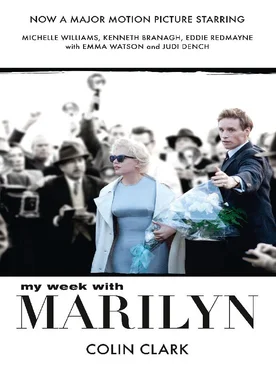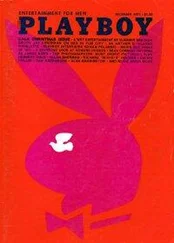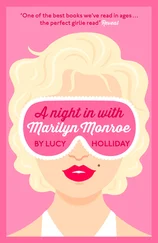Preface Preface The Prince and the Showgirl Production Crew The Diaries Postscript My Week with Marilyn Dedication Introduction Tuesday, 11 September 1956 Wednesday, 12 September Thursday, 13 September Friday, 14 September Saturday, 15 September Sunday, 16 September Monday, 17 September Tuesday, 18 September Wednesday, 19 September Postscript Appendix Resurrecting Marilyn Picture Section About the Author Praise for Colin Clark Copyright About the Publisher Конец ознакомительного фрагмента. Текст предоставлен ООО «ЛитРес». Прочитайте эту книгу целиком, купив полную легальную версию на ЛитРес. Безопасно оплатить книгу можно банковской картой Visa, MasterCard, Maestro, со счета мобильного телефона, с платежного терминала, в салоне МТС или Связной, через PayPal, WebMoney, Яндекс.Деньги, QIWI Кошелек, бонусными картами или другим удобным Вам способом.
In 1943, when I was ten years old, my boarding school decided that my class should see Gone with the Wind. Film shows were a monthly treat then, and we had already seen several stirring black-and-white wartime epics, but Gone with the Wind was different. It was in colour, it was very long, and it contained some gruesome scenes of wounded soldiers, the sort of thing which was obviously never included in British films of the time. Our teacher took great trouble to explain to us that the film was just an illusion, made up of clever special effects. Nevertheless, watching it in that bare school hall had a dramatic effect on all of us.
At about the same time my father, Kenneth Clark, had been made controller of home publicity at the Ministry of Information. This meant that he was responsible for extricating British actors and actresses from the armed forces so that they could work in patriotic films. He made frequent visits to the studios around London to see how they were getting on, and I persuaded him to let me come too. His principal ally was Alexander Korda, who was the most powerful British producer at the time, and whom my father had persuaded to join in the ‘war effort’. Through him my father and mother met all the stars of the film world. Laurence Olivier and Vivien Leigh became their close friends, and William Walton, who was composing the music for Olivier’s Henry V, was made my godfather to replace the original one who had been killed by a bomb. Another Hungarian producer, Gabriel Pascal, had managed to persuade George Bernard Shaw to let him have the film rights to all his plays. He came to our house in Hampstead with a beautiful young American actress called Irene Worth, and promised to buy me a pair of white peacocks if I would act for him, offering me the part of Ptolemy in his production of Shaw’s Caesar and Cleopatra (with Vivien Leigh). My parents said no, but I was not the least bit disappointed: I knew that I could never be an actor, and I also knew that those white peacocks were as much a product of Pascal’s imagination as Caesar and Cleopatra was of Shaw’s.
I had become completely fascinated by the concept of a fictional idea being made into a real film, which is in itself an illusion. It is a fascination which I have never lost. At the age of twelve I explained this to my father, and told him of my determination to be a film director. My only worry was that all the directors I had met were fat and ugly. To my surprise he took me seriously. Although he was involved in all the performing arts – opera, ballet and theatre as well as film – his main love was painting. He pointed out that painting contains the same elements of illusion and reality as film, and that Michael Powell and David Lean were both successful directors, and they were thin.
From then on, a visit to a film set was like a dream fulfilled. I saw Noël Coward in a tank of oily black water making In Which We Serve; I saw Vivien Leigh being carried on a very wobbly litter in front of a plaster Sphinx on the set of Caesar and Cleopatra; I saw her again in Anna Karenina – she had offered me the role of her son, again refused; and many more. I was not in love with the magic of film the way many children are with theatre or ballet: I was in love with the way in which that magic was made.
When I got to Eton in 1946 it became clear that I had chosen a pretty eccentric path. ‘Art’ did not then have the respectable connotations that it does today. My family, though wealthy enough, was as far from the typical ‘hunting, shooting and fishing’ set as it was possible to be. None of my more conventional contemporaries had ever heard of an art historian, and I was forced to describe my father as a professor (he had been Slade Professor of Fine Art at Oxford). My friends could not understand me at all – many still can’t – and as if to underline the difference between us, I chose to be a pilot in the RAF during my National Service rather than to go into the Guards, and then to get a job as a keeper at London Zoo rather than work in a merchant bank.
In the summer of 1952, while on vacation from Oxford, I went on a motoring tour of Europe and found myself stranded in a little palace in the mountains of north Portugal. It belonged to an Englishman called Peter Pitt-Millward, and apart from his occasional guests, I had no one else with whom to converse for over two months. To make things worse, I fell passionately in love with someone who could speak nothing but Portuguese. I could not even confide in Peter about this as he was also in love – with the same person. So I started to keep a daily journal in which I could explore my emotions, and my loneliness. This feeling of isolation persisted throughout the remainder of my time at university.
By the time I got the job on The Prince and the Showgirl in 1956, my diary had become a firm friend. However tired I was, I could not sleep before I had written down some of the things that had happened during the day, and confided some of the opinions that I had not dared to express to anyone, scribbling away in an old ledger which I kept wrapped up in my pyjamas. I did not always get things right, and as I never expected anyone else to read what I had written, I had no need to be what we now call ‘politically correct’. Even so, in this published version of my diary for June to November 1956, I have cut very little out. I was a well-brought-up boy, and when you see ‘f—’ in this book it is because I wrote ‘f—’ in my diary.
When the filming of The Prince and the Showgirl was over, it was many, many years before I dared to read my diary of that time again, just as it was many, many years before I could bring myself to see the film in a cinema. Even now I have trouble seeing past the pain and anxiety in Marilyn Monroe’s eyes.
This book is really all about Marilyn. For five months, whether she turned up or not, she dominated our every waking thought. I was the least important person in the whole studio, but I was in a wonderful position from which to observe. The Third Assistant Director is really a kind of superior messenger boy. I got to meet everyone and go everywhere, unencumbered by responsibilities which might tie me down, or narrow my viewpoint. No one can feel threatened by a 3rd Ast Dir (except perhaps the ‘extras’, who he has to keep under control), and most of the people involved in making the film felt they could be more open with me than with a possible rival. When the filming was completed I was almost the only person who was still on speaking terms with everyone else. That alone probably makes this diary unique.
The Prince and the Showgirl The Prince and the Showgirl Production Crew The Diaries Postscript My Week with Marilyn Dedication Introduction Tuesday, 11 September 1956 Wednesday, 12 September Thursday, 13 September Friday, 14 September Saturday, 15 September Sunday, 16 September Monday, 17 September Tuesday, 18 September Wednesday, 19 September Postscript Appendix Resurrecting Marilyn Picture Section About the Author Praise for Colin Clark Copyright About the Publisher Конец ознакомительного фрагмента. Текст предоставлен ООО «ЛитРес». Прочитайте эту книгу целиком, купив полную легальную версию на ЛитРес. Безопасно оплатить книгу можно банковской картой Visa, MasterCard, Maestro, со счета мобильного телефона, с платежного терминала, в салоне МТС или Связной, через PayPal, WebMoney, Яндекс.Деньги, QIWI Кошелек, бонусными картами или другим удобным Вам способом.
Читать дальше












